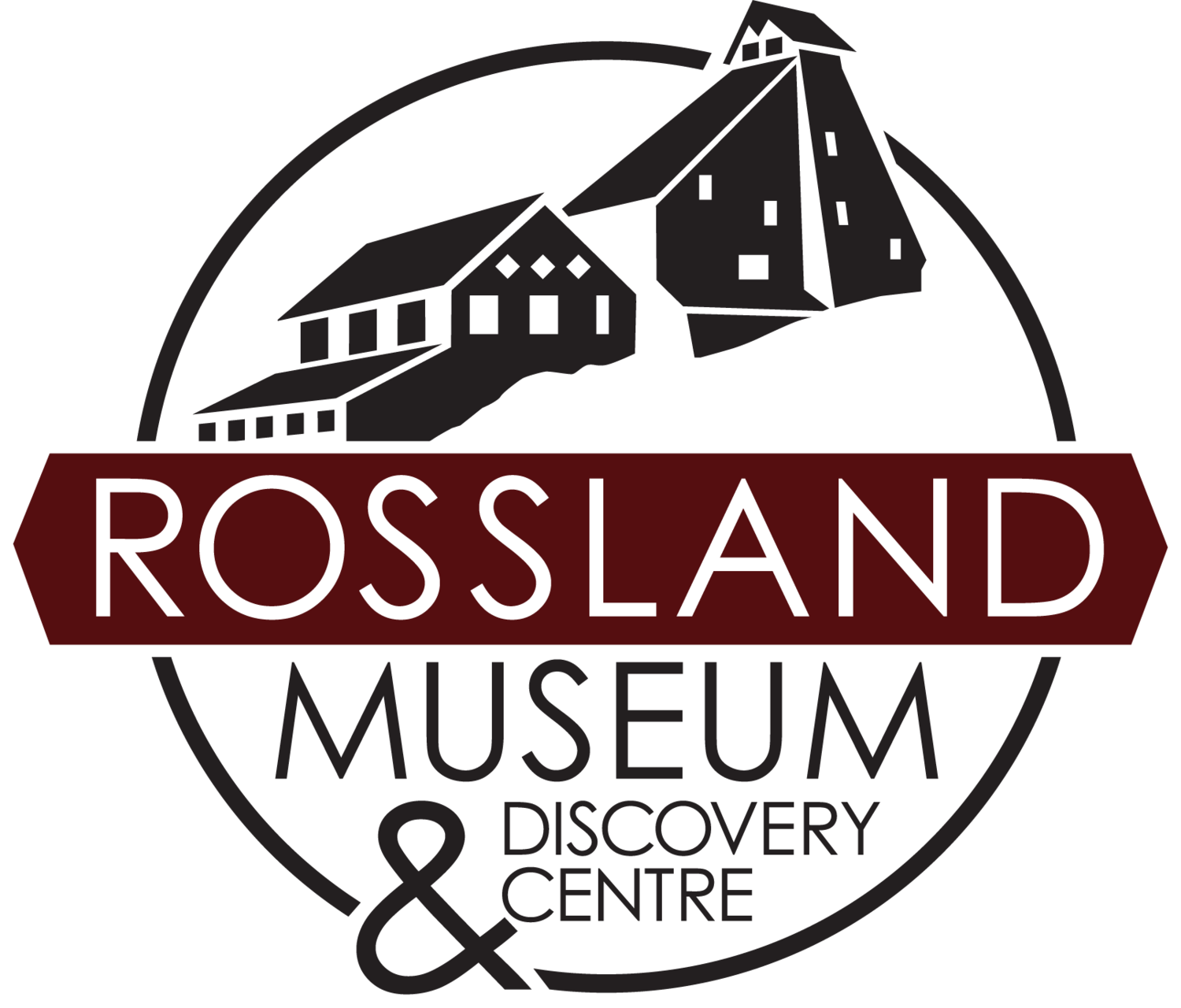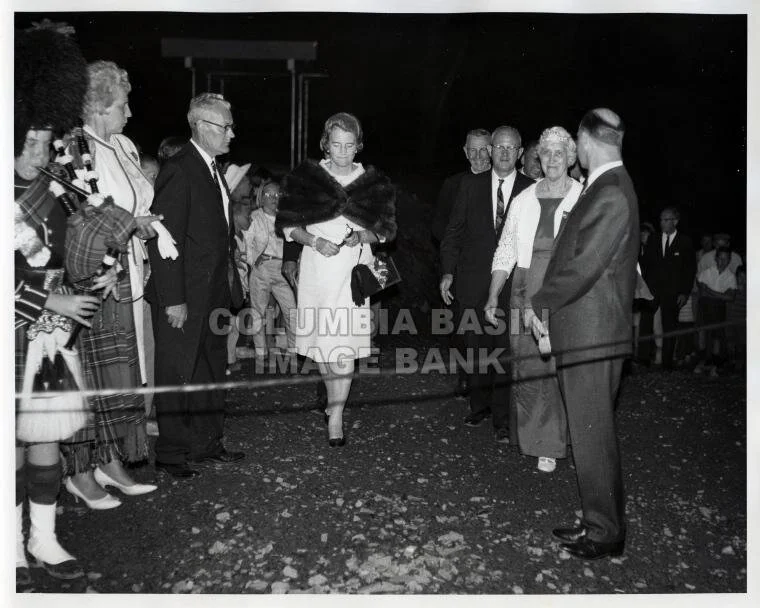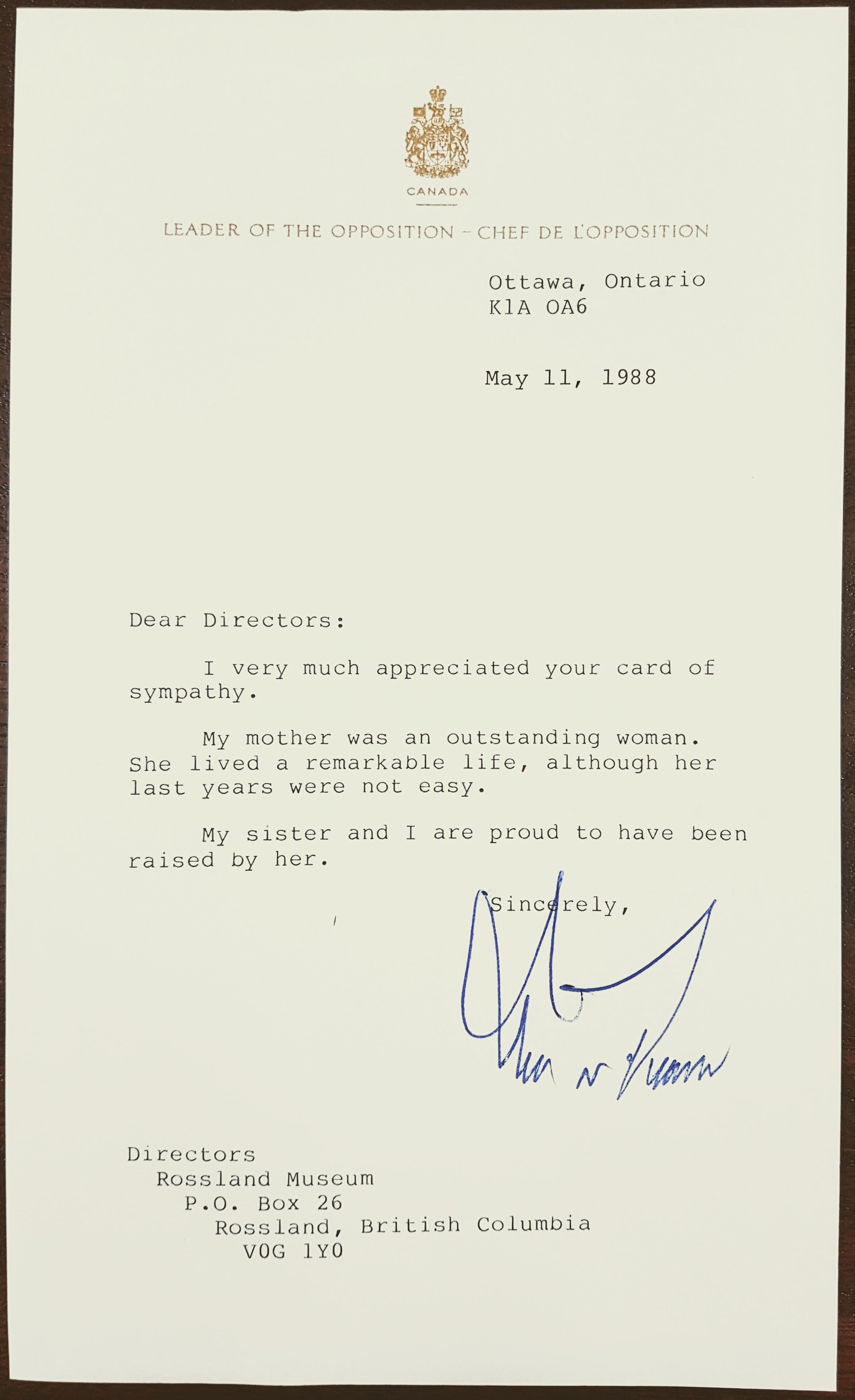Phyllis Gregory Turner Ross
Known also as “Miss Serene Efficiency” and “The Lady with the Facts,” Phyllis Turner was a huge contributor to Canadian political, social, and cultural life. To date, Phyllis is most well-known as the mother of John Napier Turner, who in 1972 became Minister of Finance under Pierre Trudeau, and had a brief, three-month stint as Prime Minister of Canada in 1984. Phyllis was an incredible woman in her own right, and we’re pleased to highlight her personal legacy!
From the Rossland Miner - October 9th, 1958.
The Life of Phyllis Turner Ross
Phyllis Turner Ross (nee Gregory) was born in 1903. She was the fourth and youngest child of a mining hoist operator, Jimmy Gregory, and his wife Mary Margaret (nee Macdonald) of Nova Scotia. The original family home was 2418 Washington Street (still standing) - and John Turner says his mother was born in that house. She was a talented piano player and played in church - her family was Catholic. We’re not quite sure where she attended school as a child in Rossland, likely Central School until it burned down, and then MacLean School. The Gregory’s lived in Rossland until 1937.
We do know that she was a great student and took her education seriously because in 1925, she graduated from the University of British Columbia with an honours BA in Economics and Political Science.She was awarded the Susan B. Anthony Fellowship to Bryn Mawr College (Pennsylvania) where she completed her master’s degree in 1927.
After that, she entered the Bryn Mawr doctoral program, again on scholarship. She spent the first semester of the 1927-28 academic year in England, studying at the London School of Economics, then travelled to the University of Marburg in Germany to do research for her thesis.
While Phyllis was abroad, she met Leonard Turner who styled himself a man of “independent means.” He was allegedly quite a captivating character. Phyllis left her studies, married Leonard, and had three children in three years: John (b. 1929), Michael (died in infancy), and Brenda (b. 1931). In 1932, Leonard began experiencing thyroid problems and an experimental surgery only complicated matters. He died of acute broncho-pneumonia that November, leaving Phyllis a penniless widow. Phyllis took John and Brenda and moved back to Rossland with her parents; she rarely spoke about Leonard after that.
Back in Rossland, Phyllis sought to rebuild her life. In any biographical sketches of Phyllis, it’s never mentioned how she found her way to Ottawa, but the Gibson family remembers that William K. “Billy” Esling, a Rosslander and MP for Kootenay West, heard of Phyllis’ intelligence and need of work and set her up with a bureaucratic position with the Tariff Board in Ottawa.
In the 1930s, it was rare to see women in bureaucratic positions, but there was a recognition that Phyllis needed to support her family, so she kept her job - and, she was great at it. Phyllis was smart and charming and quickly made friends in Ottawa. Her circle of friends included Norman Robertson (a future undersecretary of state in the Department of External Affairs), Graham Towers (governor of the Bank of Canada), Hugh Keenleyside (future secretary to the Canadian section of the Permanent Joint Board of Defence during the war), and R.B. Bennett (Prime Minister of Canada through the Depression). By 1937, Phyllis was the Tariff Board’s Chief Economist.
Paul Litt, a biographer of John Turner, wrote that “A childhood friend of the Turner children remembered that their mother was nice but “quite a disciplinarian.” “She wasn’t domineering or oppressive,” Brenda explained, “but Mummy believed in striving for excellence. Not for fame or money or ambition – which is rather déclassé, isn’t it – but for excellence.” “She had a thing about ... doing one’s duty and she pushed him [John] hard,” recalled another friend. If John got anything less than an A on his report card, she would want to know why. “She knew John was bright and she always expected it of us,” Brenda recalled. “If you’ve been given talents, given gifts, use them.”
“Rossland Girl Wins Honors” from the Rossland Miner, May 14th, 1925.
When World War II was declared, Phyllis was seconded to the War Time Prices and Trade Board as an economic advisor, and eventually became the Fats and Oils Administrator. She was the only female administrator on the Board. Part of her job was responsibility for “everything from soap to starch, paint to printing ink,” and she was tasked with finding new sources of oils for the War Effort. For her work during the War, Phyllis was made a Commander of the Order of the British Empire.
Allyson Kenning, who wrote a great series in the Rossland Telegraph called “Tales and Legends of the Mountain Kingdom,” noted that by 1945, “Phyllis, as Chief Economist of the Tariff Board, had achieved the highest office a woman could hold in the Canadian Civil Service, but even as such, she only received two thirds the salary a man in the same position would make.”
Also in 1945, Phyllis married Frank Mackenzie Ross, an industrialist, and future Lieutenant Governor of British Columbia (1955-1960). Frank and Phyllis returned to BC and Phyllis applied her energies to positions on UBC’s senate (1951-1954), a variety of positions supporting the educational and charitable fields, and rebuilding Government House, which had burned down in a fire in 1957. In 1961, she was appointed chancellor of UBC; she was the first female chancellor of UBC, and first female chancellor in the Commonwealth.
In her capacity as “chatelaine,” wife of the Lieutenant Governor of British Columbia, Phyllis made two official trips to her hometown of Rossland. One was in 1958, and the other was as honourary chairperson of the Rossland Historical Museum Association where she turned the first sod for our museum building. She came again in 1967 and cut the ribbon at the opening ceremony of the museum.
In 1967, she was made a Member of the Order of Canada, recognizing her years of public service to the country. Phyllis Gregory Turner Ross died in 1988, she had Alzheimer's disease.
Letter from John Turner (at that time the Leader of the Federal Opposition), to the directors of the Rossland Museum in response to their letter of condolence on the death of Turner’s mother, Phyllis Gregory Turner Ross in 1988.
Contribute your own memories/experiences about Phyllis Gregory Turner Ross:
The form below will email us your message. If you prefer to speak to us directly or have other questions or comments about this page, please call (250) 362-7722 or email the archives directly at archives @rosslandmuseum.ca




